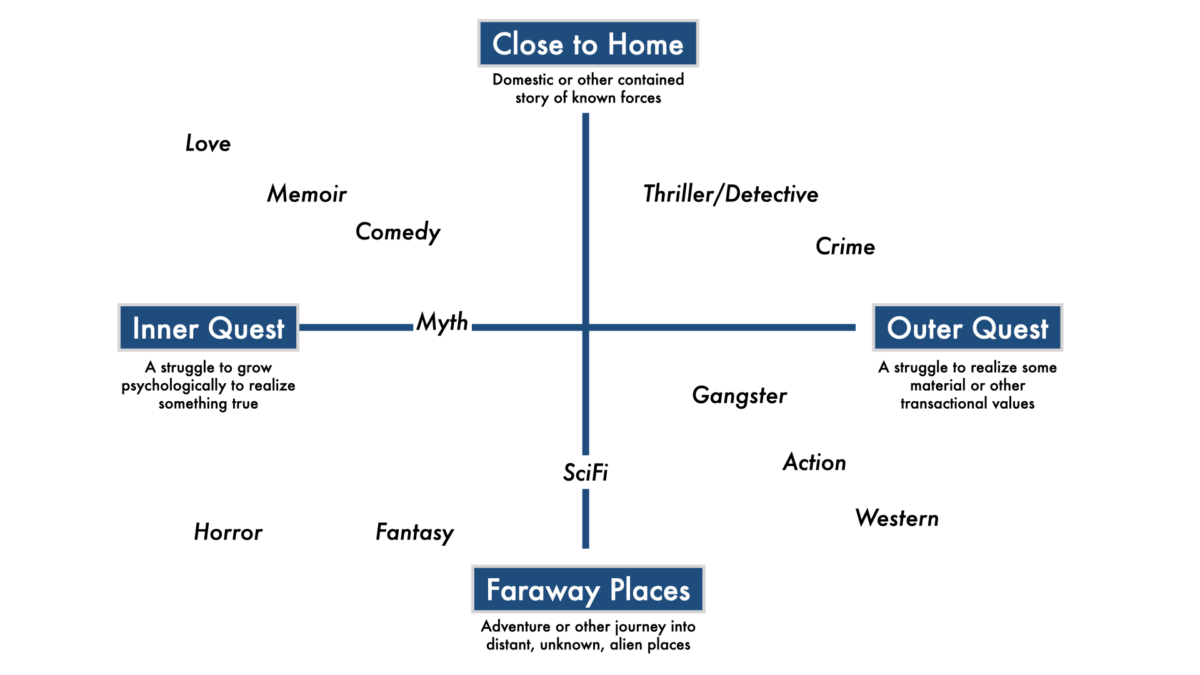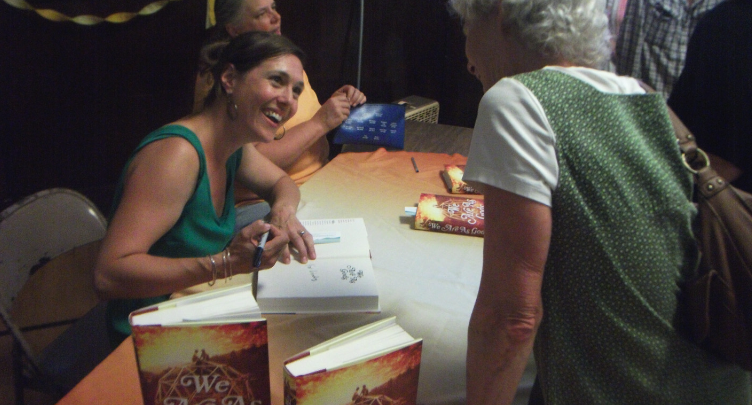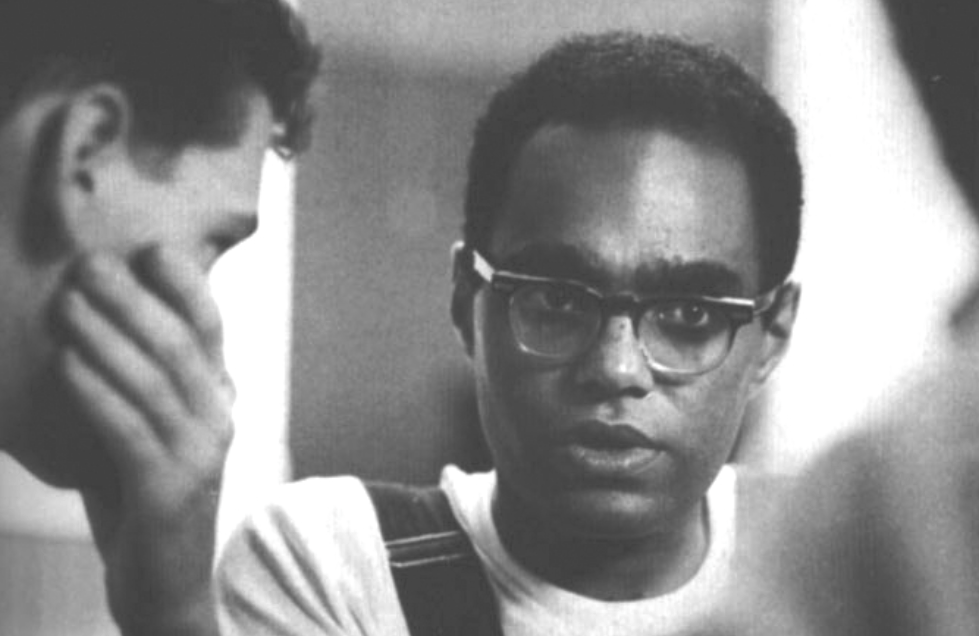-

The Moment of Truth in ‘Twelve Angry Men’
•
It’s hard to imagine more drama coming out of a small room with 12 impatient, imperfect men than the 1957 directorial debut of Sidney Lumet. Twelve Angry Men depicts jury deliberations in a capital murder case in New York City in the 1950s. Based on a play, the movie violates all kinds of storytelling…
-

Whatever Happened to TED Talks?
•
Have you ever gone back to an old school? Driven past an old Little League field where you used to play? Or stopped by an old mall, where you once did all your shopping, and found it cluttered with Dollar Stores and fast-fashion outlets? The experience is deflating. In your own mind, you imagined…
-

Genre, Simplified
•
To succeed as a storyteller–or as a musician, architect, scientist, or other creative person–you must work within a specific genre. The story genre provides the style, rules, and expectations for the tale. What kind of hero and other characters will we meet in the story? What kinds of settings, struggles, and values will we…
-

Broken and Whole
•
All my problems are meaningless, But that don’t make them go away. – Neil Young, “On the Beach” There is a crack in everything. That’s how the light gets in. – Leonard Cohen, “Anthem” Every story is about being broken and trying to become whole. All of us, even the happy ones among us,…
-

The Lucrative Drama of Super Bowl Ads
•
It’s Super Sunday again, and all the chatter is about the commercials—that and Taylor Swift. But every year, millions tune in for the ads. This year, a 30-second ad goes for $7 million. At that price, companies better have the perfect message. Luckily, about a decade ago, a couple of business professors figured out…
-

Eric R. Williams on the Machinery of Genre and Storytelling
•
When Alfred Hitchcock roamed the sets of his movies, he could be seen with a small book called Plotto. With this book of prompts, storytellers can connect 15 characters types (listed in Column A) to 62 conflict situations (Column B) and 15 consequences (Column C). In a sense, Plotto is a guide for mix-and-matching…
-

Let Us Now Praise Robert McKee
•
As the script doctor steps off the stage, a look at his impact and storytelling lessons Years ago, when I was transitioning from academic life to nonfiction narrative writing, I attended Robert McKee’s immersive Story Seminar. For three days, I sat in a New York theater for a complete course from one of Hollywood’s…
-

‘What If?’ Angus Fletcher on the Brain and Storythinking
•
What if (spoiler alert) all the wisdom of writing, storytelling, problem-solving, adventure, crisis management, and deep learning could be summed up in a two-word phrase? Thanks to Angus Fletcher, a leading authority on storytelling and the brain, we know that two-word phrase: “What if?” Fletcher, the author of the landmark work Wonderworks: Literary Invention and…
-

Kate Daloz on the Process of Researching and Writing
•
This is the second part of a two-part interview with Kate Daloz, a writing teacher at Columbia University and the author of We Are As Gods. You can find Part 1 here. Tell me about your writing process? When do you write—and what’s your process? The key part is just carving out time and…
-

Kate Daloz on Exploring a Bygone Era and Research as Me-Search
•
This is the first part of a two-part interview with Kate Daloz, a writing teacher at Columbia University and the author of We Are As Gods. You can find Part 2 here. Kate Daloz is the prototypical child of hippies—even if her parents abjure the term. She grew up in Vermont’s Northeast Kingdom when her…
-

Why the Hidden Architecture Matters
•
People immerse themselves in stories for all kinds of reasons. They want escape or adventure. They care about the characters. They love the world of the story. They love the familiarity of a genre. Many appreciate the “moral of the story,” whether it’s subtly developed or explicitly stated. Readers sometimes get annoyed when they…
-

John Truby on the New Rules of Genre Writing (Part 2)
•
This is the second part of a two-part interview with film guru John Truby. You can read the first part here. The sequence of genres could be arranged along Aristotle’s narrative arc, from the early basic challenge of survival to the ultimate development of the heart. In my mind Aristotle is probably the greatest…
-

John Truby on the New Rules of Genre Writing (Part 1)
•
This is the first part of a two-part interview with film guru John Truby. You can read the second part here. The idea of genre can be a touchy topic among writers. “Don’t classify me, read me,” Carlos Fuentes groused. “I’m a writer, not a genre.” Genre refers to a type of story–the kinds…
-

Can We Dispense the Myth about King’s ‘I Have a Dream’ Passage?
•
Every time we commemorate the life and legacy of Martin Luther King, we talk about the co-called “I Have a Dream” oration at the March on Washington on August 28, 1963. The speech is certainly worthy of the praise, as I explore in my book Nobody Turn Me Around. Some other King speeches were…
-

The Quietest Hero: Remembering Bob Moses
•
The first time I met Bob Moses, I was sitting in a lecture hall with a group of more than 100 puzzled students at Holy Cross College. The college invited Moses to speak to the First-Year Program. In that program, students in a wide range of classes–philosophy, history, theater, math, physics, the languages–grappled with…
-

Finding Focus and Organizing Ideas with Architect Christopher Alexander
•
How can creative people–architects and planners, artists and writers, musicians and performance artists–foster a sense of “wholeness” in their work? Christopher Alexander, one of the last century’s most important architects, who died last month at the age of 85, offers a mind experiment to explore this question. Take a blank piece of paper, he…
-

Tommy Tomlinson on the Craft of Writing
•
This is the second part of a two-part interview with the longtime columnist, author, and podcaster Tommy Tomlinson. You can find Part 1 here. You’ve devoted your whole life to being a writer. It shapes everything you do. How and why did you become a writer? Who were your greatest influences? I come from…
-

The One Idea: Success and Failure
•
In another post, I describe the importance of finding The One Idea for everything you write. I have both succeeded and failed in this quest. Success: Nobody Turn Me Around About a decade ago I was in the midst of writing a book about the 1963 March on Washington. At the same time, I…
-
Avery Chenoweth on Telling Stories for Business
•
This is the second part of a two-part interview with Avery Chenoweth, a writer and Spanish language translator based in Charlottesville, Virginia. You can see Part 1 here. In recent years you have used your storytelling chops to develop a business. HeresMyStory.com engages students and others who use historic sites, but getting them to…
-
Howard Bryant on Tricks of the Trade
•
This is the second part of a two-part interview with Howard Bryant, the journalist and author of books about racism and the Boston Red Sox, the steroids crisis, and activism in sports and biographies of Henry Aaron and Rickey Henderson. You can read the first part here. CE: What essential skills did you learn…
